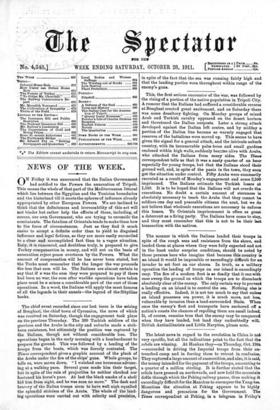This, the first serious encounter of the war, was followed
by the rising of a portion of the native population in Tripoli City. A rumour that the Italians had suffered a considerable reverse at Benghazi created great excitement, and on Saturday there was some desultory fighting. On Monday groups of mixed Arab and Turkish cavalry appeared on the desert horizon and threatened the Italian outposts. Later a strong attack developed against the Italian left centre, and by midday a portion of the Italian line became so warmly engaged that reserves of the battalions were moved up. This seems to have given the signal for a general attack, and the intricate suburb country, with its innumerable palm trees and small gardens enclosed within high walls, suddenly bec,-..e alive with Arabs, who attacked the Italians from many sides. The Times correspondent tells us that it was a nasty quarter of an hour especially for young troops, but that the Italians stood their ground well, and, in spite of the panic in the town, they soon got the situation under control. Fifty Arabs were summarily executed as a result of Monday's engagement and some 2,500 imprisoned. The Italians estimate the Turkish losses at 1,500. It is to be hoped that the Italians will not overdo the executions. No doubt a certain amount of sternness is absolutely necessary to teach the Arabs that they cannot be soldiers one day and peaceable citizens the next, but we do not believe that wholesale executions are necessary to enforce this lesson. To Orientals imprisonment is often as great a deterrent as a firing party. The Italians have come to stay, and they must remember that this is not to be their last transaction with the natives.










































